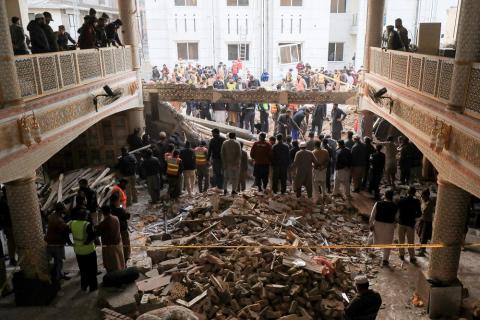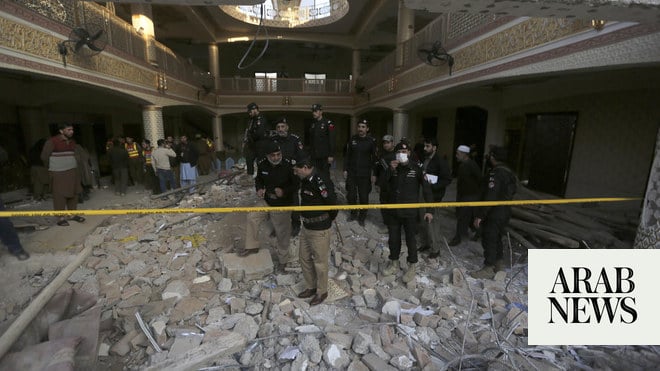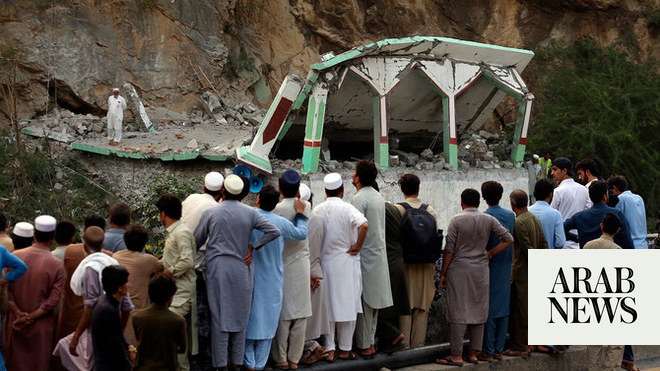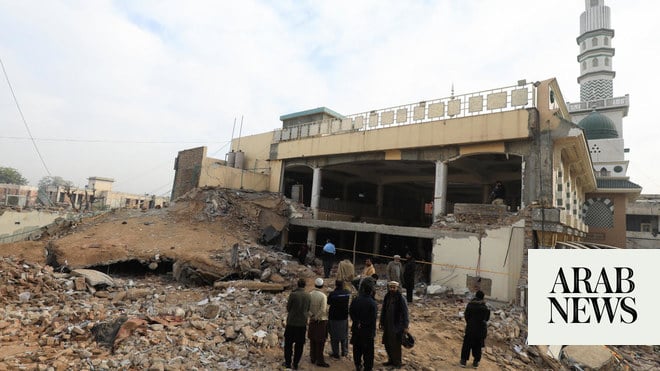
A suicide blast at a mosque inside a police headquarters in Pakistan that killed more than 90 people was a targeted revenge attack, a police chief said Tuesday.
Between 300 and 400 policemen had gathered for afternoon prayers at the compound's mosque on Monday in the provincial capital Peshawar when an entire wall and most of the roof were blown out, showering rubble on officers.
"We are on the frontline taking action against militants and that is why we were targeted," city police chief Muhammad Ijaz Khan told AFP.
"The purpose was to demoralize us as a force."
Low-level militancy, often targeting security checkpoints, has been steadily rising in the areas near Peshawar that border Afghanistan since the Taliban seized control of Kabul in August 2021.
The assaults are claimed mostly by the Pakistani Taliban, as well as the local chapter of ISIS, but mass casualty attacks remain rare.
The head of Khyber Pakhtunkhwa province police force, Moazzam Jah Ansari, told reporters that a suicide bomber had entered the mosque as a guest, carrying 10-12 kilograms (about 22-26 pounds) of "explosive material in bits and pieces".
He added that a militant group that was on-and-off affiliated with the Pakistani Taliban could be behind the attack.
Authorities are investigating how a major security breach could happen in one of the most tightly controlled areas of the city, housing intelligence and counter-terrorism bureaus, and next door to the regional secretariat.
The nation is already being hobbled by a massive economic downturn and political chaos, ahead of elections due by October.
Search for survivors
Provincial Chief Minister Muhammad Azam Khan confirmed it was a suicide blast, putting the latest death toll at 95, with more than 221 wounded.
Corpses were still being pulled from the wreckage of a collapsed wall and roof, with rescuers using listening devices to try and detect heartbeats beneath the rubble.
"I remained trapped under the rubble with a dead body over me for seven hours. I had lost all hope of survival," Wajahat Ali, a 23-year-old police constable whose feet were broken, told AFP from hospital on Tuesday.
Survivor Shahid Ali said the explosion took place seconds after the imam started prayers.
"I saw black smoke rising to the sky. I ran out to save my life," the 47-year-old police officers told AFP.
Dozens of slain police officers have already been buried in several mass prayer ceremonies, with coffins lined up in rows and draped in the Pakistani flag while a guard of honor was performed.
"Terrorists want to create fear by targeting those who perform the duty of defending Pakistan," Prime Minister Shehbaz Sharif said in a statement.
Rising militancy
In a statement, the Pakistani Taliban -- separate from the Afghan Taliban but with a similar extremist ideology -- denied it was responsible for the latest blast.
Known as the Tehreek-e-Taliban Pakistan, it carried out a years-long wave of horrific violence after emerging in 2007 but recently has attempted to rebrand itself as a less brutal outfit, claiming not to target places of worship.
But a security official in Peshawar, who asked not to be named, said Tuesday that authorities were considering all possibilities including the involvement of a TTP splinter faction, ISIS or a coordinated attack by several groups.
"Often in the past militant groups, including the TTP, that carry out attacks in mosques do not claim them" because a mosque is considered a sacred place, the official told AFP.
Pakistan was once plagued by almost daily bombings, but a major military clearance operation which started in 2014 largely restored order.
Analysts say militants in the former tribal areas adjacent to Peshawar and bordering Afghanistan have become emboldened since the return of the Afghan Taliban, with Islamabad accusing the new rulers of failing to secure their mountainous frontier.
But mass casualty attacks remain relatively rare, with ISIS claiming the most recent blast on a Shiite mosque in Peshawar last March that killed 64.
Provinces around the country announced they were on high alert after the blast, with checkpoints ramped up and extra security forces deployed, while in the capital Islamabad snipers were posted on buildings and at city entrance points.
Pakistan is also hosting an International Monetary Fund delegation from Tuesday as it works towards unlocking a vital bailout loan to prevent a looming default.
UN Secretary-General Antonio Guterres on Monday condemned the blast as "abhorrent", and US Secretary of State Antony Blinken extended his condolences for the "horrific attack".











